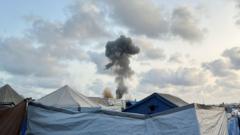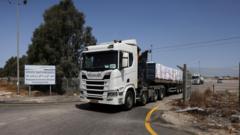In a decisive move, the United States will impose fresh sanctions on Sudan after allegations surfaced that the nation used chemical weapons in its continued conflict with the Rapid Support Forces (RSF). This announcement from the State Department comes on the heels of a deteriorating humanitarian crisis resulting from two years of brutal fighting, which has claimed over 150,000 lives and displaced millions.
US Imposes New Sanctions on Sudan for Chemical Weapons Use

US Imposes New Sanctions on Sudan for Chemical Weapons Use
The US government has announced new sanctions against Sudan following reports of chemical weapon usage in its ongoing civil war.
The US has taken action against Sudan after investigative findings indicated the use of chemical weapons during the civil conflict, particularly chlorine gas, known for its harmful effects. These sanctions will restrict US exports and impose limits on financial borrowing as of June 6, according to State Department spokesperson Tammy Bruce. It marks a significant step by Washington to enforce accountability for alleged war crimes by both the Sudanese military and RSF, despite Sudan's current military controls over the capital, Khartoum.
While the US has previously imposed sanctions on Sudanese leaders for actions deemed destabilizing to peace efforts, this latest round has been linked to rising geopolitical tensions involving the United Arab Emirates. The UAE has denied allegations of providing arms to the RSF, even as Sudan's government accuses it of complicity in the conflict. Amidst these complexities, the Biden administration's commitment to ceasing chemical weapons proliferation is emphasized, alongside an international obligation under the Chemical Weapons Convention, which Sudan is expected to adhere to like most countries worldwide.
The situation remains dire, with approximately 25 million people needing food assistance in Sudan, and international calls have increased for both the cessation of violence and immediate humanitarian support for affected populations.
With ongoing military confrontations and humanitarian crises, observers note that the effect of these sanctions will likely be minimal, given the prior measures already in place. The future remains uncertain as the US grapples with balancing its diplomatic strategies with regional complexities in the broader Middle East.
While the US has previously imposed sanctions on Sudanese leaders for actions deemed destabilizing to peace efforts, this latest round has been linked to rising geopolitical tensions involving the United Arab Emirates. The UAE has denied allegations of providing arms to the RSF, even as Sudan's government accuses it of complicity in the conflict. Amidst these complexities, the Biden administration's commitment to ceasing chemical weapons proliferation is emphasized, alongside an international obligation under the Chemical Weapons Convention, which Sudan is expected to adhere to like most countries worldwide.
The situation remains dire, with approximately 25 million people needing food assistance in Sudan, and international calls have increased for both the cessation of violence and immediate humanitarian support for affected populations.
With ongoing military confrontations and humanitarian crises, observers note that the effect of these sanctions will likely be minimal, given the prior measures already in place. The future remains uncertain as the US grapples with balancing its diplomatic strategies with regional complexities in the broader Middle East.


















